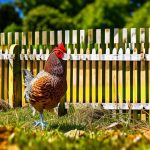Raccoons are highly intelligent and resourceful creatures known for their dexterous paws and problem-solving abilities. These primarily nocturnal animals are most active during nighttime hours. Raccoons are omnivorous, consuming a wide variety of foods including fruits, vegetables, insects, small mammals, and even garbage.
Their excellent climbing skills allow them to easily scale fences and trees to access food sources. Raccoons are notably curious and will investigate anything that captures their interest. Understanding raccoon behavior is essential for developing effective strategies to keep them away from properties.
Raccoons demonstrate remarkable adaptability and thrive in urban environments. They are drawn to areas with readily available food and shelter, making chicken coops and residential properties attractive targets. By comprehending their behavior and habits, property owners can implement proactive measures to deter raccoons from causing damage and becoming a nuisance on their property.
Table of Contents
- 1 Securing the Chicken Coop
- 2 Installing Predator-proof Fencing
- 3 Using Motion-activated Lights and Alarms
- 4 Removing Attractants from the Property
- 5 Utilizing Natural Deterrents
- 6 Seeking Professional Help if Necessary
- 7 FAQs
- 7.1 What are some effective ways to keep raccoons away from chickens?
- 7.2 Why are raccoons a threat to chickens?
- 7.3 What are some signs that raccoons are targeting my chickens?
- 7.4 Are there any natural deterrents for keeping raccoons away from chickens?
- 7.5 Is it legal to trap or kill raccoons to protect chickens?
Key Takeaways
- Raccoons are nocturnal and intelligent animals that are attracted to food sources and shelter.
- Securing the chicken coop with sturdy locks and latches can prevent raccoons from accessing the birds.
- Installing predator-proof fencing with a buried apron can deter raccoons from digging under and gaining access to the property.
- Motion-activated lights and alarms can startle raccoons and discourage them from approaching the property.
- Removing attractants such as pet food, garbage, and fallen fruits can help reduce the likelihood of raccoons visiting the property.
- Natural deterrents like predator urine, ammonia-soaked rags, and bright lights can help keep raccoons away.
- Seeking professional help from wildlife control experts may be necessary if raccoon infestations persist despite preventive measures.
Securing the Chicken Coop
Secure the Coop with Sturdy Materials
Raccoons are skilled at breaking into coops and can easily pry open doors, windows, and latches. To prevent this, it’s essential to use heavy-duty locks and hardware cloth with small openings to keep raccoons from reaching through and grabbing chickens.
Reinforce the Coop Structure
Reinforcing the coop with solid wood or metal materials can make it more difficult for raccoons to break in. This added layer of protection will help to deter raccoons from attempting to gain access to your chickens.
Regularly Inspect and Repair the Coop
Regularly inspecting the coop structure for any potential entry points is crucial in preventing raccoons from infiltrating the coop. Raccoons are persistent creatures and will continue to try to gain access if they see an opportunity. By conducting routine checks and repairs, property owners can stay one step ahead of raccoons and protect their chickens.
Installing Predator-proof Fencing

Installing predator-proof fencing around the perimeter of the property is another effective way to keep raccoons at bay. This type of fencing is designed to be sturdy and tall enough to prevent raccoons from climbing over or digging under it. It’s important to bury the bottom of the fence at least a foot underground to deter raccoons from digging their way in.
Additionally, adding an outward-facing overhang at the top of the fence can make it even more challenging for raccoons to climb over. When installing predator-proof fencing, it’s crucial to ensure that there are no gaps or weak spots that raccoons can exploit. Regular maintenance and repairs should be conducted to keep the fence in optimal condition and prevent any potential breaches.
By creating a physical barrier around the property, property owners can significantly reduce the risk of raccoon intrusion.
Using Motion-activated Lights and Alarms
Motion-activated lights and alarms can be effective deterrents for raccoons and other nocturnal pests. Raccoons are naturally wary of sudden bright lights and loud noises, which can startle them and drive them away from the property. By strategically placing motion-activated lights around the perimeter of the property, property owners can create an environment that is less appealing to raccoons.
In addition to lights, installing motion-activated alarms can further enhance the effectiveness of this deterrent method. When a raccoon triggers the motion sensor, a loud alarm will sound, alerting property owners and scaring off the intruder. This combination of visual and auditory stimuli can disrupt the comfort and safety of raccoons, making them think twice about returning to the property.
Removing Attractants from the Property
Raccoons are attracted to properties that offer easy access to food, water, and shelter. By removing these attractants, property owners can make their property less appealing to raccoons. This includes securing garbage cans with tight-fitting lids, removing fallen fruits and vegetables from the ground, and keeping pet food indoors.
It’s also important to eliminate any potential hiding spots such as brush piles, woodpiles, or overgrown vegetation where raccoons can seek shelter. In addition to food and shelter, water sources can also attract raccoons to a property. Property owners should fix any leaky outdoor faucets, drain birdbaths at night, and cover swimming pools when not in use to prevent raccoons from accessing water on the property.
By removing these attractants, property owners can significantly reduce the likelihood of raccoon activity on their property.
Utilizing Natural Deterrents

Strong-Smelling Substances
One effective way to discourage raccoons from visiting a property is to use strong-smelling substances such as ammonia or vinegar around the perimeter. Raccoons have a keen sense of smell and are sensitive to strong odors, which can act as a natural repellent.
Predator Urine
Another natural deterrent is the use of predator urine, such as that of coyotes or foxes. Raccoons are instinctively wary of predators and will avoid areas where they sense a potential threat. By strategically placing predator urine around the property, property owners can create a perceived risk for raccoons, deterring them from approaching.
Other Natural Deterrents
In addition to strong-smelling substances and predator urine, there are other natural deterrents that can be used to keep raccoons away. These may include certain types of plants, noise-making devices, and other non-toxic methods that can be used to discourage raccoons from frequenting a property.
Seeking Professional Help if Necessary
If raccoon activity persists despite implementing various deterrent methods, property owners may need to seek professional help to address the issue. Wildlife control experts have the knowledge and experience to effectively manage raccoon problems and can provide valuable insights and solutions tailored to specific property needs. Professional wildlife control services may include trapping and relocating raccoons, installing exclusion devices to prevent re-entry, and providing ongoing monitoring and maintenance to ensure long-term success.
Additionally, wildlife control experts can offer guidance on legal considerations and ethical practices when dealing with raccoons. In conclusion, understanding the behavior of raccoons is essential for developing effective strategies to keep them away from your property. By securing the chicken coop, installing predator-proof fencing, using motion-activated lights and alarms, removing attractants from the property, utilizing natural deterrents, and seeking professional help if necessary, property owners can effectively deter raccoons and protect their property from damage and nuisance wildlife activity.
If you’re looking for more tips on keeping your chickens safe from predators like raccoons, check out this article on renting a chicken coop. It offers valuable insights on how to provide a secure and comfortable living space for your feathered friends.
FAQs
What are some effective ways to keep raccoons away from chickens?
Some effective ways to keep raccoons away from chickens include securing the chicken coop with strong locks, using motion-activated lights or sprinklers, and installing an electric fence around the coop.
Why are raccoons a threat to chickens?
Raccoons are a threat to chickens because they are skilled predators and can easily break into chicken coops to prey on the birds. They are also known to carry diseases that can be harmful to chickens.
What are some signs that raccoons are targeting my chickens?
Some signs that raccoons are targeting your chickens include missing or injured birds, damage to the chicken coop or fencing, and the presence of raccoon tracks or droppings near the coop.
Are there any natural deterrents for keeping raccoons away from chickens?
Some natural deterrents for keeping raccoons away from chickens include using strong-smelling substances like ammonia or predator urine around the coop, and planting thorny bushes or plants that raccoons dislike near the coop.
Is it legal to trap or kill raccoons to protect chickens?
Laws regarding the trapping or killing of raccoons vary by location, so it is important to check local regulations before taking any action. In some areas, it may be legal to trap or kill raccoons if they are posing a threat to livestock.
Meet Walter, the feathered-friend fanatic of Florida! Nestled in the sunshine state, Walter struts through life with his feathered companions, clucking his way to happiness. With a coop that’s fancier than a five-star hotel, he’s the Don Juan of the chicken world. When he’s not teaching his hens to do the cha-cha, you’ll find him in a heated debate with his prized rooster, Sir Clucks-a-Lot. Walter’s poultry passion is no yolk; he’s the sunny-side-up guy you never knew you needed in your flock of friends!







